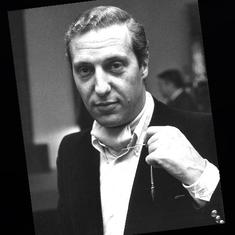Ananthamurthy introduced us to medieval Indian thinkers like Basava and Caravaka, contemporary ones like Iravati Karve and Ashis Nandy, historical figures like Ram Manohar Lohia, and dozens of writers in the Indian languages who were largely unknown in the West. We laughed, we drank, we argued, and transported ourselves out of the harsh midwestern winter. For Ananthamurthy, there was no division between his students and his private life – he believed in the guru-shishya tradition. In the decades since then, I’ve regularly stayed with him in Mysore or Bangalore, to seek his advice about my writing, and about the scope and direction of my life. For me and many, many others, he has been an intellectual lodestar, the wisest man I’ve ever met.
He travelled abroad often and had many invitations to teach at prestigious foreign universities. But he stayed in India, to do his dharma, battling bigots and yahoos in and out of government. He had his share of enemies, but a far greater share of admirers. Once I went to receive him at the Mumbai airport, and he came out beaming. When the cabin crew on his flight from Bangalore had seen his name, they had upgraded him to business class. “In India,” he noted, “it still means something to be a writer.”
A public intellectual
Ananthamurthy was politically engaged, he was a public intellectual, but first and foremost he was a storyteller. His stories were a vibrant combination of the folk tales and gossip of his village in Shimoga, and the epics, scriptures, and great texts of world literature. V. S. Naipaul in India: A Wounded Civilization spends several pages writing very respectfully about Samskara, Ananthamurthy’s best-known work. Naipaul called it a “remarkable novel”, that “takes us closer to the Indian idea of self, and without too much mystification… its India is not over explained or dressed up for simplified”.
Go read Samskara, and you will come away marvelling at Ananthamurthy’s keen sympathy for the fallible and the fallen, as in the affair between the priest Praneshcharya and the prostitute Chandri. You will also be struck by his mastery of the medium itself. I once had the difficult task, along with his son Sharath, of attempting to translate a poem of great nuance that he wrote in Kannada:
“Our ancients did not say/ ‘Nataraja dances’/ They said, ‘Nataraja dances here’/ Pointing to the ground and/ Showing where.”
The poem could be a summary of his approach to his own writing: not the airy generalities of pedestrian poetry, but a time- and place-specific narrative, rich in precisely rendered details.
These were the things my guruji loved: his wife Esther and his daughter Anu and his son Sharath and his son-in-law Vivek and his grandchildren; good whiskey; electronic gadgets; the films of Ingmar Bergman; the evening adda in his house; the Kannada language; and a good argument.
This is what he hated: hypocrisy.
I will miss him so.










